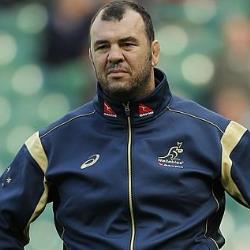
Michael Cheika – Wallabies coach
The Australian conference’s struggles in Super Rugby has alarm bells ringing Down Under, where media pundits have condemned the nation’s lack of playing depth in a Rugby World Cup year.
4 Of Australia’s teams, including the reigning champion Waratahs, are mired in the bottom 6 of the 15-team southern hemisphere competition halfway through the season.
The 5th, Canberra-based Brumbies, are 2nd but battling to hold ground against New Zealand and South African rivals amid a mounting injury toll.
The conference’s solid performance last season, when the Waratahs broke through for their maiden title and the Brumbies reached the semi-finals, was hailed as a sign of the increasing depth of Australian rugby.
Those achievements have been quickly forgotten, with the Melbourne Rebels, Reds and Western Force conjuring a total of 5 wins between them from the opening 9 Rounds.
“The Australian teams are fielding too many players who are well short of the required standard, which has led to a drop in match quality and crowd interest,” prominent rugby writer Greg Growden said in a column for ESPN.
“ARU (Australian Rugby Union) officials will remain bunkered down though – desperately praying the 2nd half of the Super Rugby competition is better than the 1st.”
The 10th-placed Waratahs’ title defence rests on a knife edge after their 32 / 18 trouncing by the Cape Town-based Stormers at home, with coach Michael Cheika under huge scrutiny as he juggles Super Rugby with his role as Wallabies head coach.
Last year, the Perth-based Force toasted their best season since joining the competition in 2006 but have been rudderless without captain Matt Hodgson.
The 2011 champion Reds were tipped to be the big improvers in Australia but lost marquee signing Karmichael Hunt to a 6 week ban for a cocaine drug charge at the start of the season and have reaped little mileage out of their other high-profile recruit James O’Connor.
The Australian teams’ travails bode poorly for the Wallabies’ World Cup campaign in England, where they face a tough ask just to advance to the knockout rounds from a pool including the hosts and Wales.
The Super Rugby competition will be further expanded to 18 teams next year with the addition of Argentine and Japanese franchises and another South African side.
This will coincide with a massive talent drain, as established national players take up far more lucrative contracts in Europe and Japan after the World Cup.
Where the world champion All Blacks showed after their 2011 triumph that they could absorb the blow to their playing stocks, Australia’s more modest pool could mean more headaches for Cheika.
Sport24